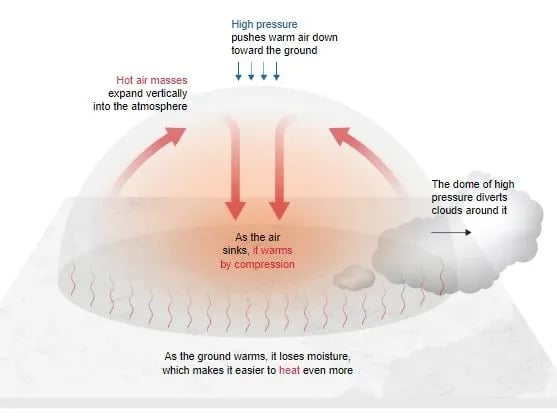Syllabus: GS1/Physical Geography
Context
- The state of Assam has recently experienced unprecedented temperatures nearing 40°C in September, unusual for the region, which may be attributed to the Heat Dome Effect.
About Heat Dome Effect
- The heat dome effect is a type of high-pressure system (also known as anticyclone) that forms over a large area in the atmosphere, and causes extremely hot and dry weather conditions.
- The system traps hot air and prevents it from flowing to rise and cool.
- This air then becomes compressed and heats up, leading to a dome-shaped area of hot air that can persist for several days or even weeks.

- Due to climate change, heat domes have not only become more frequent but also a lot more intense.
- The rising temperatures and changes in weather patterns are creating conditions that are assisting their formation.
Impact of Heat Domes
- Heat domes can cause dangerous heat waves causing the temperatures to shoot up.
- They can also lead to drought conditions and wildfire as the hot and dry weather can quickly dry out vegetation and make it more susceptible to catching fire.
- It can also have severe impacts on human health, agriculture, and ecosystems.
- Heat domes can persist for several days to weeks, depending on atmospheric conditions. The longer they last, the more severe the impacts can become.
Heat Domes vs Heat Waves
- While many people use ‘heat domes’ and ‘heat waves’ interchangeably, heat domes are just one of the atmospheric conditions that can contribute to the formation of a heat wave.
- A heat wave is a prolonged period of excessively hot weather, often accompanied by high humidity.
- Heat waves can occur for a variety of reasons, including the presence of a heat dome.
- Heat waves can also occur without the presence of a heat dome, such as when warm, humid air masses from the tropics move to an area and stagnate for an extended period.
Source: IE
Previous article
News In Short-24-09-2024
Next article
‘Pact of the Future’ Promising to Reform the UNSC